The Qantas flight path under Alan Joyce: high-flyer to nosedive
Joe Aston’s book about Qantas examines the murky relationship between the nation’s politicians and the Flying Kangaroo.
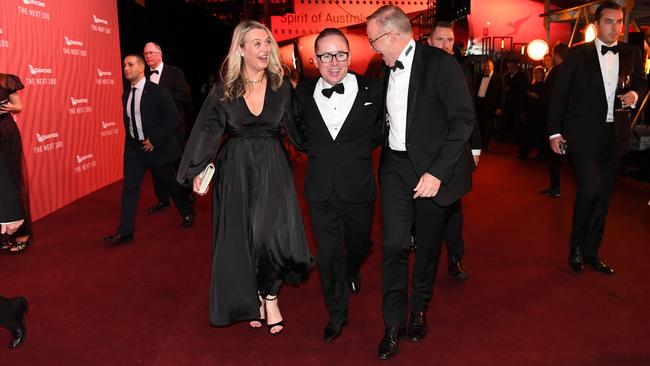
Joe Aston is preparing to fly to London. Mischievously, I ask him: Qantas?
His answer? Incredibly, it’s yes!
Wait … points?
“Exactly,” Aston says, and there you have it, Qantas in a nutshell. They can and just recently have treated their customers and their own staff terribly, and yet Australian travellers (and politicians) continue to fly with them.
What drives this dysfunctional relationship? Aston picks at the web of influence the company has over you, the poor traveller, and Australian transport policy, in his new book, The Chairman’s Lounge (Simon and Schuster) which is out on Monday. Upon reading it, you may decide that Australian politicians have serious questions to answer, as do the board, but we’ll get to them.
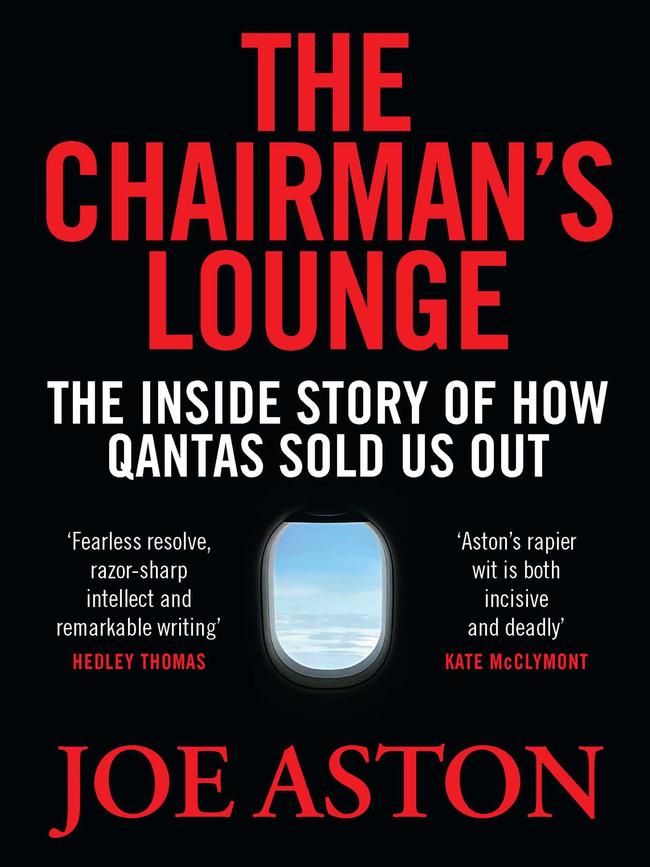
In the meantime, let’s meet Joe.
The venue for this – his first interview about The Chairman’s Lounge – is a plywood coffee shop near his home in Sydney’s Surry Hills. It’s 7am, and Aston is early. He has been rising before dawn since he stopped drinking, several years ago now. Quitting wasn’t easy, by which I mean, on his drinking buddies. Aston was, until recently, a columnist at the Australian Financial Review and entertaining was an important part of the gig. When he started telling people he’d quit the booze, some said: “OK, I’ll wait until you start again before we have that lunch.”
This seems unfortunate, and unfair: a mutual acquaintance tells me that Aston is “only 5 per cent less funny” now that he doesn’t drink. He’s also more considered, and on this early morning, no less charismatic. In any case, we settle down for a bespoke single origin. Aston’s not in a rush. He doesn’t have a day job, having quit the column last year. Given the rumoured generosity of his package, I’m keen to know why.
“I was tired of combat. I had done it for 12 years, and I thought, am I going to wake up in another 10 years, and say I’ve been doing it for 22 years?” he says.
What he doesn’t say is that satire is a tough gig in the defamation capital of the world (larrikinism, in Australia, long ago gave way to Birkin-clad lawyers.)
Aston says he tried his hand at a novel – “I wrote a few chapters, and never looked at it again” – before starting The Chairman’s Lounge.
“The book opens with some declarations: Aston used to work for Qantas, having started in the communications department when he was just 24 years old. Shyly, he admits to being a bit of a plane-spotter (“not quite, let’s drive up to the fence and see what planes are landing, but close,” he says.)
Upon moving into journalism, he took freebies from Qantas and other airlines. For example, in October 2017, he was invited on a junket by the then-CEO, Alan Joyce, to Seattle to collect some new Qantas planes.
“It was a boisterous occasion, I dimly recall,” he writes.
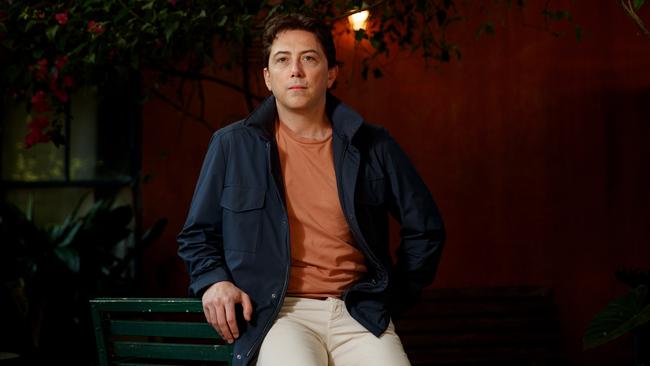
The first Qantas representative to greet him on the tarmac wasn’t Joyce. It was Annabelle Cottee, a PR manager in the airline’s Los Angeles office, who is now Aston’s wife.
“Yes, I even have Alan Joyce to thank for my marriage,” he writes. They now have a baby (it’s a boy, and he’s a little beauty, and he’s sleeping through! How? Because the Astons recently had a sleep whisperer from Byron Bay come in to help.)
Aston says he didn’t have cause to poke Joyce too hard, or even all that often, during his early years as an AFR columnist, because Qantas was … OK, let’s just say lean into the cliches, shall we? Pre-pandemic, they were flying high. In 2019, the company generated $1.3bn of annual pre-tax profit, and the share price was $7.40.
Joyce should have quit while he was ahead. He didn’t.
Aston reflects on this, saying: “Had Joyce called time in 2019 on his eleven-year tenure, he’d have retired a hero … Instead, Alan Joyce became the most hated businessman in Australia … a Senate committee threatened to throw him in jail.”
What happened?
Team Joyce – the former CEO has engaged a crisis management team to deal with fallout from Aston’s book – would say: Covid happened. And Joyce can’t be held responsible for Covid.
Aston accepts this, but his book is devoted to decisions taken during and after Covid, which really got the public’s goat. For example, Qantas took $1.6bn worth of tickets people couldn’t use during the pandemic and turned them into so-called “flight credits”. How did you spend yours? Trick question! The flight credits were practically impossible to use, not least because planes weren’t flying during Covid. Qantas could have refunded their customers. They decided instead to torture people who just wanted (and in many cases needed) their money back. They also sold tickets on so-called “ghost flights” they had already cancelled (they have accepted a $120m penalty for this) and they got rid of a lot of tremendously loyal and highly trained staff.
Qantas says it was just trying to survive. But when Covid ended, the company didn’t lean into its reputation as the kind-hearted, family-oriented Flying Kangaroo. Under Joyce, it instead took on an extra level of meanness, prioritising profit (sorry, shareholder returns) over customers in a country where air travel isn’t a luxury so much as an essential service.
For example, Qantas almost immediately jacked up prices to eye-watering levels: business class tickets from Sydney to New York were at one point selling for $25,000, more than double 2019 prices. At the same time, customer service plummeted (lost bags, delayed flights, no food, you name it.) When customers expressed dismay, Joyce tried to pretend they were at fault, complaining that they weren’t “match fit”.
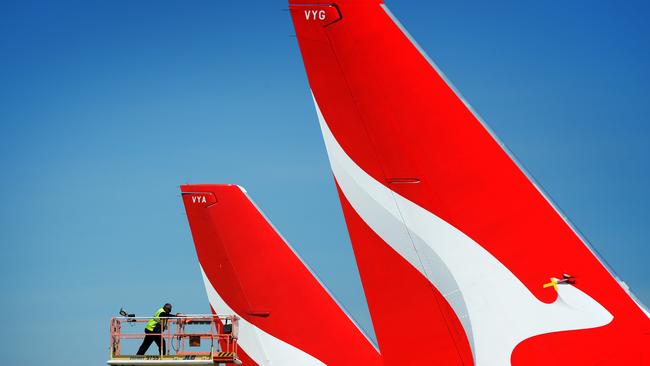
With phone lines melting down, and Qantas customers literally sobbing in airport queues across the country, you’d expect politicians to step up, wouldn’t you? Aston says they don’t, because there is hardly a pollie who isn’t licking at the Qantas trough.
It’s all laid out in the book: Australian politicians regularly take free upgrades to business and first class on Qantas, not only for themselves, but for their spouses and their kids. Qantas also offers membership of the Chairman’s Lounge (it’s a private club, designed to make members feel oh-so-important) to all serving politicians, their spouses, and plenty of senior public servants.
These people then go on to decide transport policy, including whether rival airlines – Qatar, for example – can fly into Australia.
Isn’t that problematic?
Qantas says it’s simply trying to protect its patch (it’s not like politicians don’t have to declare upgrades and freebies – they do.). But the impact is apparent: according to figures unearthed by Senator Jacqui Lambie, federal politicians and their staff spent $32.7m flying around Australia last financial year and – guess what? – Qantas took $25.6m, or 78 per cent, of that.
Did Qantas always have the cheapest, most direct fare? No. Virgin often had better deals.
“There’s a policy that says they should be seeking the cheapest fare, and that policy is being flouted,” says Aston. He thinks the reason is obvious: pollies like the Chairman’s Lounge, and public servants are collecting status points, in the hope of being able to fly platinum forever. Now that we have a properly working-class PM in the Lodge, we’ll be seeing a stop to that, surely?
Ho, ho, ho!
Aston says Prime Minister Anthony Albanese seems particularly fond of freebies and the luxurious surrounds of the Chairman’s Lounge.
“For all his talk of growing up in public housing, his appetite for sponsored VIP hospitality and travel is insatiable,” he says, adding that it was Albo who petitioned Alan Joyce to have the privileges of the Chairman’s Lounge extended to his then 22-year-old son, Nathan.
Albanese complained, bitterly, when the story broke in Aston’s newspaper column. “This is a game played by people when their back is against the wall,” says Aston. “Albanese said: ‘You can’t attack my son. You’re attacking my son. He’s not a public figure.’
“No one was ever attacking his son. What Albo did, through his grasping behaviour, was throw his son into the middle of the traffic. No one else did that. I didn’t do that. The Prime Minister did that because he can’t help himself.
“He spoke to Alan Joyce and said, ‘Can you please give my son a member of the Chairman’s Lounge?’ And no other Prime Minister has ever dreamed of asking that question. I mean, it is pretty shocking.
“Now, I’m not saying now that there is established causation between Albanese getting a Chairman’s membership for his son, and Qatar Airways, for example, being blocked (from flying more frequently into Australia).
“But what it does do is raise a lot of questions.”
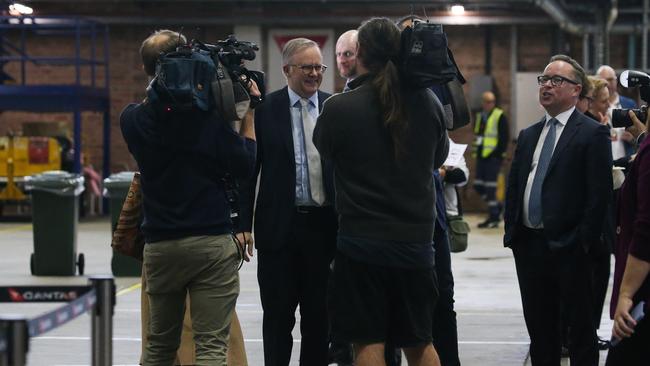
OK, so we can’t rely on politicians, but what about the board? Don’t they have a role to play in keeping Qantas free of turbulence? They do, but just wait until you hear what they’re making out of the company. Did you know that every Qantas board member and their spouse and every one of their children under the age of 26 are each entitled to three long-haul return trips, and nine short haul trips, anywhere on the Qantas network, at the highest class, every single year?
What’s the package?
Aston does the maths: “On the (imperfect) assumption that the 2024 price of a Sydney–London first-class return ticket is $18,000 and a Sydney–Melbourne business class return ticket is $1500, the market value (for a) Qantas director with a partner and two children under eligible age is more than $500,000,” he writes.
If that were not mind-boggling enough, every director and their spouse and the adult kids remain entitled to free flights after the director has left the board for a term equal to their board service.
In practice, this means former board member Maxine Brenner and her spouse, whose name may be familiar to you – it’s Jodee Rich – will be entitled to fly first class to London, annually, until 2034, with Todd Sampson’s kids entitled to the first class seats right alongside them.
Aston says it’s “hilariously” outside community expectations, as was the munificence extended to Joyce, who was paid an eye-blinking $120m over his tenure. That is more than any of the CEOs of any of the banks (it’s more than some of them combined).
“It is far, far too much money,” says Aston, “but he would say, quite rightly, that shareholders voted for it.”
Readers will find a statement from Joyce in Aston’s book, in which he says he refused to talk to Aston because “I have serious reservations about whether it will provide readers with an accurate, fair and balanced account of my tenure at Qantas.”
Aston is relaxed about this, saying: “I was very open to having his perspective directly in the book. And I think he would have benefited. But that’s his call.” He includes a line from the former chairman, Richard Goyder, who once declared Joyce to be “the best CEO in Australia by the length of a straight”.
Aston asked the new Qantas chair, John Mullen, what he thought of that claim. He said: “I think Joyce was a very effective CEO in earlier times. He did a good job … but no, I don’t think you could possibly call him the best in Australia.”
Dumping a bucket?
Aston says: “I think it’s objectively true. I mean, Joyce was a very effective CEO for a while … and then he wasn’t.”
Which, again, is a bit like Qantas itself: for a while, it was everyone’s favourite company. And then it wasn’t. And maybe that’s OK because they are back in profit, and the shareholders (and no doubt the directors) are happy. But we lost a certain something, as a nation, when Qantas went manky kangaroo on us. And it won’t be easy to get that certain something back.




To join the conversation, please log in. Don't have an account? Register
Join the conversation, you are commenting as Logout